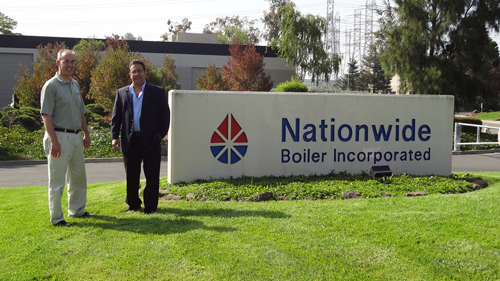Nationwide Boiler Inc. is excited to announce the company's new Venezuelan representative, QIS De Venezuela, C.A. QIS has been instrumental in securing a new boiler sale to a refinery customer located in Venezuela and this new agreement not only helps Nationwide Boiler gain new opportunities in Venezuela, but it also aids in Nationwide Boiler's on-going efforts to develop relationships in additional regions within South America.
Jeff Shallcross, Nationwide Boiler's CEO explains, "This new partnership is well aligned with the company's global strategic initiatives. QIS' vast experience and knowledge of the Venezuelan market strengthens Nationwide Boiler's ability to supply boiler equipment to industrial end-users searching for a reliable source of steam in Venezuela."

Nationwide Boiler Sales Engineer Tim McBride with QIS' Freddy Lindarte
Boiler Blog | Nationwide Boiler Inc.
http://www.nationwideboiler.com/pdfs/steamlines_summer_2011.pdf
Fremont, CA, July 26, 2011.... Nationwide Boiler Inc. continues to expand internationally with the signing of its newest representative, Thermal Energy Services Inc. (TES), located in Alberta, Canada. TES provides industrial construction, maintenance and fabrication services for steam and power facilities. The company has extensive project experience in the oil, gas, power, and pulp and paper industries. This agreement with Nationwide Boiler Inc. increases TES' product offerings, which includes the rental and sale of mobile boiler rooms, trailer-mounted boilers and skid-mounted boilers.
Larry Day, Nationwide Boiler's Vice President of Sales & Marketing, states, "Thermal Energy's experience in engineering, construction, assembly and repair work to customers in Alberta and British Columbia will greatly aid in the creation of new boiler rental and sale opportunities. Their commitment towards complete customer satisfaction is a powerful asset and we look forward to a long-term partnership supporting both new and previous customers."
Founded in 2003, Thermal Energy Services is a multi-disciplined construction, design, procurement, fabrication and maintenance company. Their business model centers on private ownership, employee participation, performance measurement and complete customer satisfaction. For more information, visit www.thermalenergy.ca.
The EPA has provided guidance to facilities that may be subject to the mandatory Greenhouse Gas (GHG) Reporting Rule, which covers GHG emissions from stationary fuel combustion and other sources. Facilities that generate greater than 25,000 mt CO2 from stationary combustion sources are covered by the program and are required to register by August 1, 2011. The reporting of 2010 greenhouse gas emissions is due by September 30, 2011.
For additional details about the program or the new reporting tool, visit the links below:
Greenhouse Gas Reporting Program's Website: www.epa.gov/climatechange/emissions/ghgrulemaking.html
GHG Applicability Tool: http://www.epa.gov/cleanenergy/energy-resources/calculator.html
GHG Emissions Information: http://www.epa.gov/climatechange/ghgemissions/


